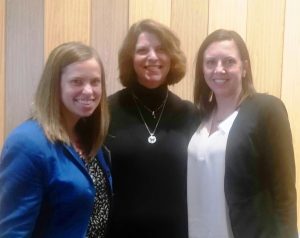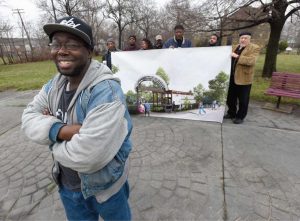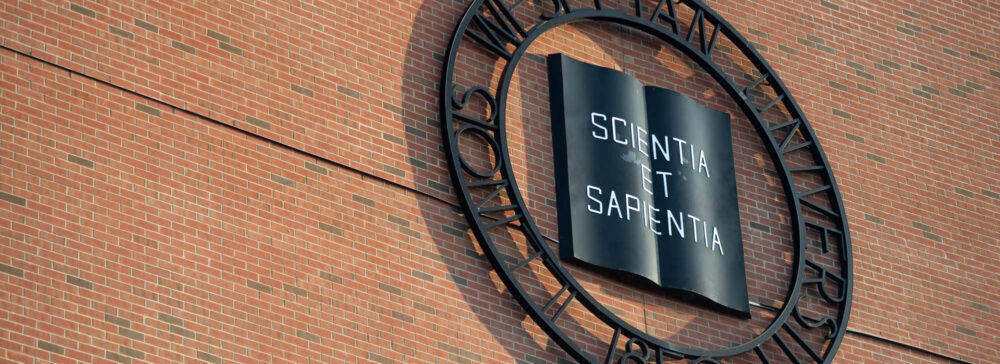After Black Friday and Cyber Monday is #GivingTuesday, a global initiative to celebrate generosity and give back during the holiday season. Join the movement and help make bright futures possible for current Titans with a gift at www.iwu.edu/give today!
Category Archives: News
Jerry and Saquenna Watkins welcome Sienna Janiece 6/24/2017
Homecoming 2017: Back to College Classes – Coco Bassey ’10
Coco Bassey ’10 is the founder and editor in chief of Millennielle, a digital lifestyle and fashion publication, created in 2013 by and for millennial women. Alongside her blog, she also works as a Product Marketing Manager for Wolters Kluwer Tax & Accounting North America in the metro Atlanta area. IWU welcomed Coco as an Alumni Speaker for Back to College Classes at Homecoming 2017, Titans Around the World. Her class, entitled “The Importance of a Powerful Digital Brand”, may be viewed below.
Congratulations, Coco!
The Importance of a Powerful Digital Brand from IWU Video on Vimeo.
Matthew Tannenbaum ’10 IWU Memory.
My fondest memories are Tuesday studio dinners with Dr. Moham, late night Survey study sessions in the Ames reading room with Renee Cook and Susan Rapp (catered by McDonald’s), and of course the first week of freshman year when Sam Katz introduced me to one of my now best friends, Nicolette Varan!
Register now for Homecoming 2017 – Favorite memories
There is less than 1 month until Homecoming 2017!
While counting down the days until we are all back on campus, let’s reminisce about the time we spent at IWU. My fondest memories from IWU are taking karate, being a part of the volleyball and water polo teams, and the friendships I’ve made and kept (shout out to my bestie, Matt Tannenbaum)!
Would anyone like to share their favorite IWU memories? Comment below!
If you are still deciding on which events you want to attend during Homecoming, the International RSO Fair is highly recommended. It will be on Saturday (10/14) at the Hansen Student Center, Center Court from 11 am – 1 pm. Come learn more about our multicultural registered student organizations and enjoy activities and musical performances. A light lunch will be provided, so please register either online or by phone by 10/8!
You can visit the Homecoming Facebook page or the International RSO Fair Facebook event for more information.
Laurie Diekoff leaves IWU Hart Career Center after 10 years
Laurie Diekhoff departed from IWU after 10 years at the Hart Career Center.
Laurie told her colleagues, “I spent 10 great years at the Career Center, enjoying my work, my colleagues, and the many relationships I have made on campus and in the community as a result of this position. Assisting students with their career development plans, helping employers fulfill their hiring needs, developing new programs, and contributing to the ongoing success of the Hart Career Center has been quite rewarding!”
We wish Laurie the best in her new adventure.
Hannah (Detig) Meyers ’10 at Leading Age Illinois Leadership Academy
 When Hannah (Detig) Meyers ’10 (above left) enrolled in the Leading Age Illinois Leadership Academy, she discovered that two IWU alumna had also signed up: Krista (Webber) Borbely ’92 (center) and Andrea (Pierce) Luke ’06. “We had never met before this program and it was so fun to share with fellow Titans,” wrote Meyers. The yearlong leadership program is designed for professionals in the aging services field.
When Hannah (Detig) Meyers ’10 (above left) enrolled in the Leading Age Illinois Leadership Academy, she discovered that two IWU alumna had also signed up: Krista (Webber) Borbely ’92 (center) and Andrea (Pierce) Luke ’06. “We had never met before this program and it was so fun to share with fellow Titans,” wrote Meyers. The yearlong leadership program is designed for professionals in the aging services field.Support Jamii Tata, DEDICATED community organizer in North End of Detroit
 Corey McCord, now known as Jamii Tata, went to work as soon as he graduated from Illinois Wesleyan in 2010.
Corey McCord, now known as Jamii Tata, went to work as soon as he graduated from Illinois Wesleyan in 2010.
At first, he considered heading to New Orleans to mentor through the organization “Boys Hope Girls Hope.” He decided to help 2nd and 3rd graders in Detroit, instead. This was a difficult decision for Jamii. On one hand, he helped clean up New Orleans after the hurricane; this was extremely meaningful for him. He knew if he went back to New Orleans, he would stay there. His opportunities in Detroit, on the other hand, were too urgent to ignore.
Jamii joined a community organization, “Vanguard Community Development Corporation,” a company in existence since 1994 in the North End neighborhood of Detroit. His background led him naturally to this organization. At a young age, Jamii had a gift for computers. He participated in high school computer competitions while learning graphic design at a community center at 15 years old. As a young resident, he taught poetry to youth and promoted community/civic youth participation. This naturally transitioned into early adulthood, as Jamii found his niche as a community organizer.
As a community organizer, Jamii focuses on the following:
- Technology: Jamii feels there is a technological divide between folks in the neighborhood. He feels seniors and youth alike lack computer literacy. With that in mind, he has trained and given out computers and internet access to those in need.
- Safety: Clearing lots of debris that have turned in dumping grounds and boarding up houses are a number one priority for the neighborhood. Jamii is grateful that the police have begun to build positive relationships with the neighborhood, which developed into mentoring and leadership for training residents. Residents of all ages act as block club captains, adding direct value to the community.
- Education: Jamii is determined to provide early childhood education resources and information to parents, advocate for the continuous operation and non-closure of public schools and find or create alternatives to the school systems where there are gaps to provide all of Detroit’s students a quality education.
- Jobs: Jamii supported the creation of a pipeline and built a job board to help youth, returning citizens and under or unemployed people with resume-building and soft skills, and referrals for basic needs to focus on finding a job. He focused his time to mentor youth in their mid-20’s to early 40’s, specifically expanding a youth employment program helping 16-24-year olds with social and cognitive skills.
- Volunteerism: To get people involved in community gardening, Jamii became the coordinator manager.
- Food: Partnering with Angel Food Ministries, Jamii inherited a food-buying club called “U Save,” giving community members access to food that they couldn’t easily access otherwise. In their neighborhood, there are no functioning grocery stores. Jamii knowingly had to get creative on how to provide access to produce, meats, dry goods and herbs. He guided residents towards discounts on food, providing an ordering sheet for bulk-purchase meats. With the help of a client choice food pantry, the Storehouse of Hope Collaborative and the collection of churches offering food pantry to families, along with the support of a core group of 6 AmeriCorps program members, Jamii could train everyone to address the needs of the community.
As the organization grew, leadership began to lose its focus. Due to a mission shift, Jamii felt like he was no longer serving the youth, returning citizens, elders or residents of the community. To forward his mission, Jamii gained skills in the community gardener training program called “Urban Roots”, in which he learned how to be a better organizer, grower and employ creative usages for vacant lots in the City of Detroit. He subsequently joined “Keep Growing Detroit” as an agricultural lead organizer, youth coordinator and communications manager. There he helped see the growth of more than 500 new gardens; taught over 100 young people across the city to grow and sell produce. Although he did not have much prior work in agriculture, meeting the community in this environment was a blessing. He could support 1400 gardens in the “Garden Resource Program” connecting them with resources such as seeds, plants, woodchips, compost and access to garden education classes.
Three years ago, Jamii founded the non-profit, Oakland Avenue Artists Coalition. They began with a neighborhood celebration: the North End Urban Expressions Art Festival: The Healing. The festival provided opportunities for youth and adults to express themselves through performance poetry, emceeing, dj’ing and visual art of which several murals designed to be a part of a community stage created for the event. The festival was a catalyst leading to a series of continuing community activities including a summer youth programming in mural design, carpentry and a partnership with KAN’s poetry program. In 2014, the Artists Coalition collaborated with a design and architect duo to receive an ArtPlace America grant, in which they were able to renovate an old garage into a clean shell to hold events and concerts. An abandoned barbershop was also renovated and transformed into a multi-purpose space to hold art gallery showings and community meetings. The ArtPlace America grant helped forward the vision of the Artists Coalition to create an art corridor on Oakland Avenue in the North End neighborhood. In 2015, the Coalition gained two $40k grants to develop three art pavilions honoring the history of three Detroit neighborhoods, one on Oakland Avenue. Jamii has advanced the vision of the art corridor and brought someone on to survey, analyze, and design a community planning book. In total 80 members where involved, 30 of which are still actively participating.
Jamii shared with us where he balances his focus in 2017:
- 50% Know Allegiance Nation (KAN): His goal is to raise $10,000 in produce sales. There are 3 sites – 1 farming site, community garden, butterfly/aroma/peace He intends to go to the market almost every day, create new wholesale accounts with food businesses, and is sincerely motivated to support the movement towards producing great food and healing the earth.
- Create Northeast Detroit: Jamii manages a mini grant program with folks participating in art projects and community beautification events. Jamii coordinates 3 large scale art installations in 3 parks in an area where there are over 50 parks, many of which are underutilized. He draws attention to assets of an area more known as being industrial. This ends at the end of May
- 10% focus just for Jamii: He burns out because he never stops working. He would like to focus more time for reading. Currently, through Know Allegiance Nation he is creating a bookstore: he wants to promote the growth and development of youth focused events around sharing and reading more to youth; he loves to do it. He wants to see more outlets for Michigan authors of color and emerging youth writers.
- Jamii is focusing on reshaping Artist Coalition’s mission on developing an art focused agenda whereby which artists gain knowledge to be at the table of development discussions; learn skills and have access to industrial painting and carpentry apprenticeships and learn about alternative ownership models such as cooperatives and land trusts. taking ownership of properties that are beautiful but need to be renovated for community use There is $1M of construction necessary. Specifically, abandoned buildings need a lot of work, but can add great value to the community.
Jamii has been there, done that. He started a radio station last year, training youth to perform shows and work with an online radio platform. He works on this monthly.
Currently, Jamii’s focus is his tea house, grab sandwich/salad, bookstore. His ultimate vision for this shop: you run into your neighbor, who tells you “Our neighbor down the street wrote a book. Check it out at Jamii’s bookshop.” To his point: Why can’t he support his own my neighborhood in his local shop? Bookstores played a major part in Jamii’s love for community outreach.
Overall, Jamii Tata likes to be seen and a good role model. He told me he recently met a young writer who wanted to publish a book. Jamii immediately adopted the role as a facilitator and leader in his life, and developed an entrepreneurship program.
Along with his tea house, Jamii is focusing on his organization, Create Northeast Detroit, “Create NED.” Although this will be ending soon in April, he will then be able to focus more time on youth development and establishing his tea shop. In fact, his GoFundMe vision is to raise $15k.
Will you help support him via GoFundMe?
UPDATE from Jamii 4/17/17:
“We’re putting out the 2nd community newspaper of the Create NED era as follow up to let the community know what was done with $500k ArtPlace grant. Still working on coordinating a couple of the art projects to be complete but things are going well. Got word that the artists coalition received a $100k grant from Kresge. They are publicly announcing it tomorrow. I am as excited about that as I am that my young people just published their first collection of poems: A Garden of 5 Elements with the help and support of Adobe!”
All In
April 5, 2017 is our day of giving at Illinois Wesleyan and this year’s theme is Tune In for All In! Not only is today a day for giving, it’s a day to celebrate IWU and all of the things that make it special.
Visit https://www.iwu.edu/all-in/ to learn more and donate.
Donate today! Go Titans!






